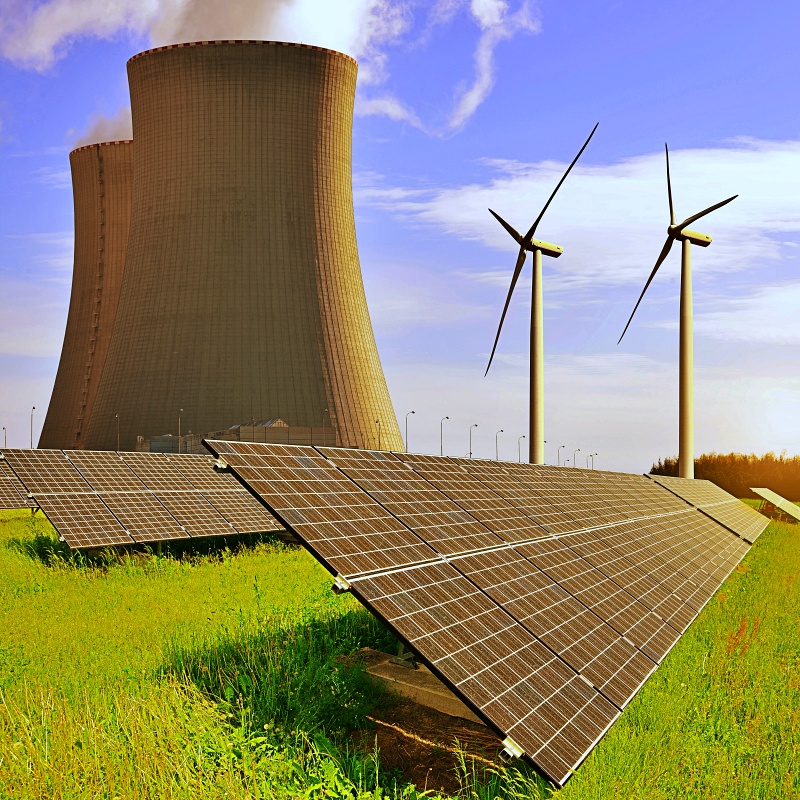With Nuclear Energy’s Potential Contribution to the Net Zero Climate Change Solution, Is It Time to Start Asking the ESG Question?
by Josh Weller, AIF® RICP®
At the time of the largest nuclear accident in U.S. history, I lived 81.4 miles northeast of Londonderry Township, PA, the site of the infamous event at Three Mile Island. Six months later, the famed MUSE Concerts For a Non-Nuclear Future (No Nukes) were held at Madison Square Garden, mobilizing a social-political movement and multiple generations vehemently against nuclear energy.
 It was unimaginable that my generational peers and I would eventually consider the environmental benefits of nuclear energy.
It was unimaginable that my generational peers and I would eventually consider the environmental benefits of nuclear energy.
Two disasters followed at Chernobyl in 1986 and Fukushima in 2011. In the interim, there has been growing evidence that nuclear energy may be safer today, and unquestionably carbon-clean, even measured against solar, wind, and the promise of “green hydrogen.”
The Shifting Political Sentiment
As the existential threat of climate change quietly forges ahead with little in the way of immediate large-scale solutions, political support for the once unthinkable nuclear solution is gaining momentum worldwide. France, a long-time advocate, derives approximately 70% of its electricity from nuclear energy (source: World Nuclear Association, Jan 2022).
Those in the Biden administration and Congress are expressing support for nuclear carbon-free energy. White House National Climate Advisor Gina McCarthy told the Washington Post, “President Biden’s plan is really not to pick winners and losers. It’s to work with our regulators, to work with the policymakers across the agencies, and to work with the private sector to make sure that anything that has promise remains on the table for opportunity.”
Proponents argue that nuclear energy brings carbon-clean stability to the electric grid, providing a constant supply and improved national energy self-reliance, as exemplified by France.
A summary of the positive view from Fareed Zakaria:
If we’re going to avoid a global climate disaster, nuclear energy will almost certainly have to be part of the solution.
This week’s last look: pic.twitter.com/cK7nbfShxn
— Fareed Zakaria (@FareedZakaria) April 25, 2021
The questions about nuclear have always been: 1) how to avoid plant accidents and 2) how to safely dispose of spent waste. Most of the current “anti” arguments revolve around waste disposal, although there is the constant specter of a nuclear plant being targeted as a weapon in war or terrorist attack, or failing from an unstoppable natural disaster such as at Fukushima.
The ESG/Nuclear Paradox
For ESG-focused investors, the conundrum is clear. With the real possibility that nuclear can be a major force in limiting greenhouse gases and reining in climate change, should believers in sustainable investing accept the rare possibility of an accident while science continues to work towards safer plant design and better nuclear waste recycling and disposal? The investing “carrot” is the opportunity to gain from uranium and nuclear plant demand, and having the satisfaction of investing in global carbon reduction.
In our Sustainable Investing work, we encourage clients to help us to help them by sharing the ESG issues closest to their hearts, so that investments are customized to reflect their passions and values. Ultimately, with our help, it’s up to the individual client to make the personal final call on thorny subjects such as investing in nuclear energy as a climate change solution.
Below I’ve provided illuminating articles and commentaries on this subject. I find that (some) reader comments in reaction to these articles can also be informative on both sides of the issue.
I welcome you to contact me directly with questions/comments.
– Josh Weller, AIF®
• • • • •
RESOURCES FOR READERS:
Is it green, or forever toxic?
NBC NEWS
https://www.nbcnews.com/science/environment/green-forever-toxic-nuclear-rift-climate-talks-rcna4545
From Momentum to Action: President Biden’s Budget Shows Tangible Support for Nuclear—Existing and New
NUCLEAR ENERGY INSTITUTE
https://www.nei.org/news/2021/from-momentum-to-action-president-bidens-budget
The false promise of nuclear power in an age of climate change
BULLETIN OF THE ATOMIC SCIENTISTS
https://thebulletin.org/2019/08/the-false-promise-of-nuclear-power-in-an-age-of-climate-change/
When it comes to nuclear, could smaller be better?
YALE SCHOOL OF THE ENVIRONMENT
https://e360.yale.edu/features/when-it-comes-to-nuclear-power-could-smaller-be-better
We Can’t Solve Climate Change Without Nuclear Power
SCIENTIFIC AMERICAN Opinion
https://blogs.scientificamerican.com/observations/we-cant-solve-climate-change-without-nuclear-power/
Global climate initiatives fall short without nuclear power in the mix: UNECE
UNITED NATIONS ECONOMIC COMMISSION FOR EUROPE
https://news.un.org/en/story/2021/08/1097572
How might the world meet its green energy needs?
BBC
https://www.bbc.com/future/article/20211103-can-renewables-replace-fossil-fuels
Investments are subject to risk, including the loss of principal. Environmental, social, and governance (ESG) criteria are a set of non-financial principles and standards used to evaluate potential investments. The incorporation of ESG principles provides a qualitative assessment that can factor heavily into the security selection process. The investment’s socially responsible focus may limit the investment options available to the investor. Past performance is no guarantee of future results.



